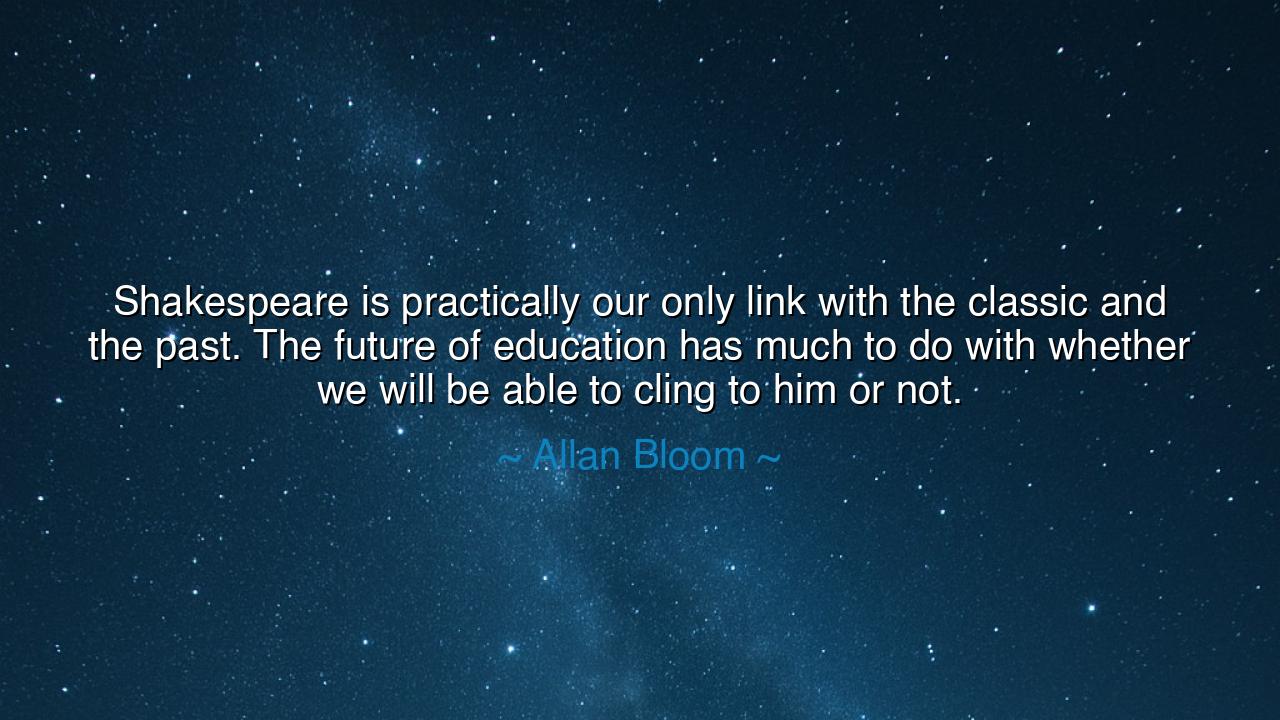
Shakespeare is practically our only link with the classic and the
Shakespeare is practically our only link with the classic and the past. The future of education has much to do with whether we will be able to cling to him or not.






Hearken, O lovers of wisdom, to the words of Allan Bloom, the philosopher of our age, who declared: “Shakespeare is practically our only link with the classic and the past. The future of education has much to do with whether we will be able to cling to him or not.” This is not merely praise for a poet, but a cry of warning and a summons to fidelity. For Bloom knew that to sever our bond with the classics is to sever our bond with the roots of wisdom itself.
In these words lies the recognition that Shakespeare is not only a playwright, but a bridge—a living connection between the grandeur of ancient Greece and Rome and the struggles of the modern soul. In his pages, kings rise and fall as in Homer, the passions of men clash as in Sophocles, the laughter of folly echoes as in Aristophanes, and the musings on justice and power rival the discourses of Plato. To lose him, Bloom warns, would be to lose our last great guide into the timeless questions of existence: What is man? What is justice? What is love? What is death?
Consider, O listener, the power of Hamlet. Within its lines lies the very spirit of philosophy. Hamlet asks, “What is man?”—a question as old as the philosophers of Athens. He wrestles with duty, mortality, truth, and deception, as though he carried on his shoulders the weight of all human thought. Through such works, Shakespeare preserves for us the ancient dialogue of the soul. To read him is not only to read a poet, but to join the eternal conversation that binds the past to the present.
Reflect upon the story of the Renaissance itself. After centuries of darkness, Europe recovered the texts of antiquity—Plato, Aristotle, Cicero—and through them gave birth to a new age of art, science, and philosophy. Shakespeare, standing in that rebirth, drank deeply from those sources and transformed them into dramas of universal scope. He became a vessel through which the wisdom of the ancients passed into modernity. Thus, when Bloom calls him “our only link,” he reminds us that through Shakespeare, the torch of classical thought has been carried forward to us.
Yet, in this present time, there are voices that cry to set aside the classics, to deem them irrelevant, to bury them beneath the rush of new technologies and fleeting fashions. This is the danger Bloom foresaw: that if we loosen our grip upon Shakespeare, we drift unanchored, losing the wisdom of the past, and thus endanger the future of education. For education is not the filling of the mind with facts, but the shaping of the soul through contact with eternal truths.
The lesson, then, is clear: if we would preserve wisdom, we must preserve Shakespeare, and with him the tradition of the classics. To neglect him is to become orphans of culture; to embrace him is to remain heirs of a great inheritance. Just as Rome without Greece would have been impoverished, so too our civilization without Shakespeare would be bereft of its richest guide.
Practical action lies in our hands. Read Shakespeare, not as mere entertainment, but as nourishment for the soul. Teach him to your children, not as an antiquated curiosity, but as a living dialogue with the eternal. Support schools and teachers who honor the classics, for they guard the very roots of our humanity. And in your private life, let his words sharpen your judgment, enlarge your imagination, and deepen your compassion.
So let Bloom’s warning be heeded: the future of education depends on whether we cling to this poet, this bridge, this living link. If we hold fast, the wisdom of the ancients shall flow through us to generations yet unborn. If we let go, we shall drift into forgetfulness. Therefore, cling, O seekers, cling to him with reverence—for in Shakespeare, the classic past still speaks, and through him, the soul of humanity yet endures.






AAdministratorAdministrator
Welcome, honored guests. Please leave a comment, we will respond soon